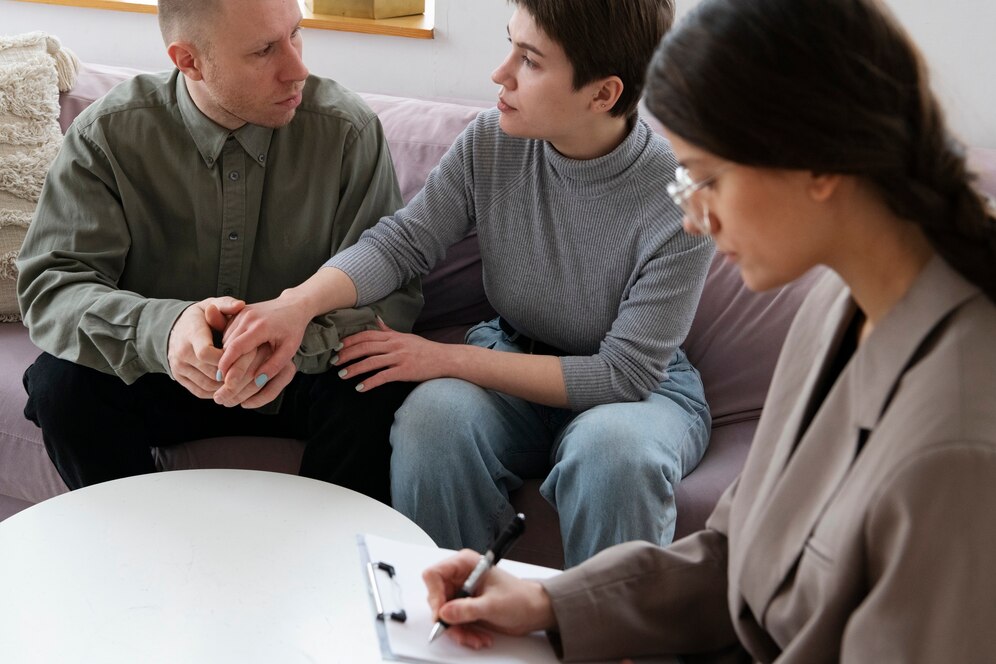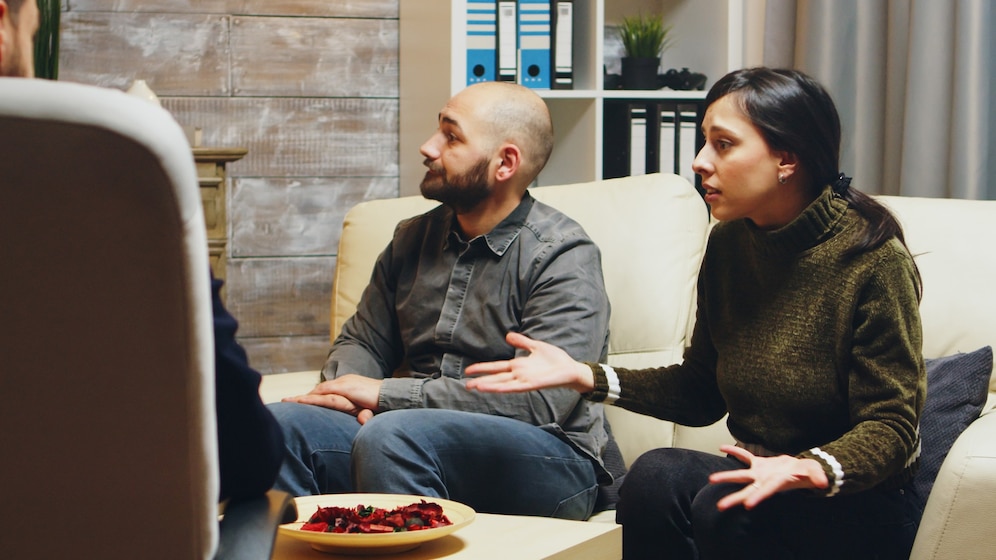United in Healing: Navigating Sobriety Together with Couples Rehab Programs
In the intricate tapestry of human relationships, love often emerges as a powerful force, capable of enduring life’s most formidable challenges. Yet, when addiction enters the picture, even the strongest bonds can be tested. Substance abuse not only affects individuals but also reverberates through their relationships, creating a ripple effect that can lead to mistrust, conflict, and emotional turmoil. Recognizing the unique struggles faced by couples grappling with addiction, specialized rehabilitation programs have emerged, offering a beacon of hope and a pathway to collective healing.
Unlike traditional rehab programs focusing solely on the individual, couples rehab acknowledges the intertwined nature of relationships and addresses the complexities of addiction within this context. This approach aims to heal individuals and mend and strengthen the relationships often strained by the throes of addiction.
This article explores the multifaceted world of Couples Rehabs in Orange Coutny, shedding light on its purpose, benefits, and the challenges couples may encounter. We will delve into the detailed rehabilitation process, from initial assessments to detoxification and therapeutic interventions, and discuss the crucial steps necessary for maintaining sobriety post-rehab. Through this comprehensive examination, we hope to provide a deeper understanding of how couples can navigate the turbulent waters of addiction together, emerging stronger and more resilient on the other side.
Couples Rehabs Services 888-325-2454
Understanding Couples Rehab
Couples rehabs, also known as couples addiction treatment, is a specialized form of rehabilitation designed to address substance abuse issues within a romantic relationship. Unlike traditional rehab programs that focus solely on the individual, couples rehab acknowledges the intertwined nature of addiction within a relationship. The primary purpose is to help both partners achieve sobriety while simultaneously working on the dynamics of their relationship. This dual approach aims to eradicate substance abuse and fortify the relationship, making it a source of mutual support and strength.
Benefits of Joint Recovery
One of the most significant advantages of couples rehab is the opportunity for joint recovery. When both partners commit to sobriety together, they can provide a unique and powerful form of encouragement and accountability. This shared journey can deepen their emotional bond and foster a greater sense of unity. Moreover, couples rehab programs often include joint therapy sessions, where couples can learn effective communication skills, conflict resolution strategies, and ways to build a healthier relationship. These tools are invaluable in creating a supportive environment that discourages relapse and promotes long-term wellness.
Challenges Faced by Couples
While the benefits of couples rehab are substantial, the journey to joint recovery is not without its challenges. One significant hurdle is the potential for codependency, where one partner’s addiction enables or exacerbates the other’s substance abuse. Addressing codependency requires delicate and often intensive therapeutic intervention. Additionally, couples may face difficulties in breaking old patterns of behavior and establishing new, healthier routines. The emotional intensity of the process can also strain the relationship, especially if one partner progresses faster in their recovery than the other. Furthermore, external pressures, such as family dynamics and social stigma, can add to the complexities of couples rehab. Successfully navigating these challenges requires a robust support system, professional guidance, and a steadfast commitment from both partners.
By understanding the unique aspects of couples rehab, partners can better prepare for the journey ahead, equipped with the knowledge and tools necessary for a successful and enduring recovery.
Rehabilitation Process
Rehabilitation for couples is a meticulously structured journey that aims to heal both individuals and their relationship. This comprehensive process ensures that each partner receives the necessary care while also fostering a supportive environment for mutual growth. The following outlines the key stages of the rehabilitation process:
Initial Assessment
The initial assessment is a critical starting point for the journey to sobriety. It involves a thorough evaluation of both partners’ physical, psychological, and emotional health. This assessment helps the treatment team to understand the dynamics of the relationship, the severity of addiction, and any co-occurring mental health disorders. By gathering this information, professionals can tailor a personalized treatment plan that addresses the unique needs of each individual and the couple as a unit.
Key components of the initial assessment include:
- Medical History: Detailed records of past and current medical conditions and medications.
- Substance Use History: Patterns and history of substance use, including types of substances, duration, and frequency.
- Psychological Evaluation: Assessment of mental health status, including any co-occurring disorders such as depression, anxiety, or trauma.
- Relationship Dynamics: Understanding the impact of addiction on the relationship, communication patterns, and levels of trust and support.
Detoxification
Detoxification, or detox, is the process of eliminating harmful substances from the body. For couples entering rehab, this stage can be particularly challenging but is essential for laying the foundation for recovery. Medical supervision during detox is crucial to ensure safety and manage withdrawal symptoms effectively.
During this phase, couples may experience:
- Withdrawal Symptoms: Physical and psychological symptoms that occur as the body adjusts to the absence of substances. These can range from mild to severe and may include nausea, anxiety, insomnia, and mood swings.
- Medical Monitoring: Continuous monitoring by healthcare professionals to manage withdrawal symptoms and prevent complications.
- Emotional Support: Emotional and psychological support to help couples cope with the challenges of detox and maintain motivation for recovery.
Therapeutic Interventions
Therapeutic interventions are the core of the rehabilitation process, providing couples with the tools and strategies needed to overcome addiction and build a healthier relationship. These interventions encompass a variety of therapeutic modalities designed to address both individual and relational issues.
Key therapeutic interventions include:
- Individual Therapy: One-on-one sessions with a therapist to explore personal issues, traumas, and triggers that contribute to addiction. This personalized approach helps individuals develop coping strategies and emotional resilience.
- Couples Therapy: Joint sessions with a therapist to address relationship dynamics, improve communication, rebuild trust, and foster mutual support. This therapy focuses on creating a healthy, sober partnership.
- Group Therapy: Participation in group sessions with other couples or individuals in recovery. Group therapy provides a sense of community, shared experiences, and valuable insights from others facing similar challenges.
- Holistic Therapies: Incorporating alternative therapies such as art therapy, mindfulness, yoga, and meditation to promote overall well-being and enhance the recovery process.
The combination of these therapeutic interventions helps couples to not only address their addiction but also to strengthen their relationship, paving the way for a supportive and sober future together.

Maintaining Sobriety Post-Rehab
Achieving sobriety within the supportive environment of a rehabilitation facility is a significant milestone, but maintaining that sobriety once the program concludes can be an ongoing challenge. For couples who have journeyed through rehab together, the transition back to everyday life involves not just individual accountability but mutual support and shared strategies. This section delves into the crucial components that help couples sustain their sobriety long after leaving the rehab center.
Aftercare Programs
Aftercare programs are a vital extension of the rehabilitation process, offering continued support to couples as they reintegrate into daily life. These programs can take various forms, such as outpatient counseling, support groups, or regular check-ins with a therapist. For couples, participating in aftercare programs together can reinforce the skills and strategies they learned during rehab, allowing them to face post-rehab challenges as a united front.
- Outpatient Counseling: Couples can benefit from regular sessions with a counselor who specializes in addiction recovery. These sessions provide a space to discuss ongoing challenges, celebrate milestones, and refine coping strategies.
- Support Groups: Engaging in support groups designed for couples can offer a sense of community and shared experience. Hearing from others who are navigating similar paths can provide both inspiration and practical advice.
- Continued Education: Workshops and seminars on topics like stress management, communication skills, and relapse prevention can be invaluable. Couples can learn new techniques and reinforce their commitment to sobriety.
Relapse Prevention Strategies
Relapse is a common concern for individuals in recovery, and for couples, it presents the added dimension of mutual influence. Developing robust relapse prevention strategies is essential
to maintaining long-term sobriety.
- Identifying Triggers: Couples need to work together to identify their personal and shared triggers. Whether it’s certain social settings, stress, or emotional states, recognizing these triggers can help in developing avoidance or coping strategies.
- Developing Healthy Routines: Establishing new, healthy routines can provide structure and stability. This might include regular exercise, meal planning, and engaging in hobbies or activities that do not involve substance use.
- Setting Boundaries: Clear boundaries regarding social interactions, including distancing from friends or family members who use substances, can be crucial. Couples should agree on these boundaries and support each other in maintaining them.
- Open Communication: Maintaining open lines of communication is paramount. Couples should regularly check in with each other about their feelings, struggles, and successes. This ongoing dialogue can prevent misunderstandings and foster a supportive environment.
Building a Support System
A strong support system extends beyond the couple. Building a network of supportive friends, family, and community resources can provide additional layers of accountability and encouragement.
- Family and Friends: Engaging with family and friends who are supportive of the couple’s sobriety is important. This might involve educating loved ones about addiction and recovery, and setting expectations about how they can help.
- Community Resources: Many communities offer resources such as local support groups, wellness programs, and recreational activities that promote a sober lifestyle. Couples should explore these options and integrate them into their lives.
- Professional Support: Continued engagement with healthcare professionals, such as therapists, doctors, and addiction specialists, ensures that couples have access to expert guidance and intervention if needed.
Maintaining sobriety post-rehab is a dynamic and ongoing process. For couples, the journey requires a combination of personal commitment, shared goals, and external support. By embracing aftercare programs, developing effective relapse prevention strategies, and building a robust support system, couples can navigate the complexities of post-rehab life and continue their path to wellness together.
Relapse Prevention Techniques at Couples Rehabs
Love’s journey to sobriety is a profound and transformative experience that encompasses much more than simply overcoming addiction. Couples rehab offers a unique path to wellness, allowing partners to heal together, support each other, and rebuild their lives in unison. This collaborative approach to recovery recognizes the importance of relationships in the healing process and leverages the strength of the couple’s bond to foster resilience and long-term sobriety.
Understanding the intricacies of couples rehab is crucial. It involves not only the mutual commitment to sobriety but also a willingness to confront and navigate the challenges that come with addiction and recovery. The process begins with a thorough initial assessment, followed by detoxification and various therapeutic interventions tailored to the couple’s unique needs. These steps are designed to address both individual and relational aspects of addiction, ensuring a comprehensive approach to recovery.
However, the journey does not end with the completion of a rehab program. Maintaining sobriety post-rehab requires continuous effort and support. Aftercare programs, relapse prevention strategies, and building a robust support system are essential components that help couples sustain their recovery and thrive in their newfound sobriety. By staying engaged in these ongoing processes, couples can reinforce their commitment to a sober lifestyle and navigate the complexities of life together.
In essence, couples rehab is about more than just quitting substances; it’s about rediscovering and rebuilding a life of shared purpose and joy. It offers couples the tools and support they need to not only survive but to thrive in their relationships and personal lives. As such, the journey to sobriety through couples rehab is not just a path to wellness; it is a path to a deeper, more meaningful connection that can withstand the test of time and life’s inevitable challenges.

- FAQ: What is the role of couples rehab in the journey to sobriety? Answer: Couples rehab plays a vital role in the journey to sobriety by providing a supportive environment for both partners to heal together, strengthening their foundation for long-term recovery.
- FAQ: How can Love’s Journey to Sobriety program at Couples Rehab benefit couples seeking wellness? Answer: The Love’s Journey to Sobriety program at Couples Rehab offers evidence-based therapies and personalized treatment plans to support couples in their path to wellness and sobriety.
- FAQ: What makes Couples Rehabs’ Path to Wellness unique for couples in recovery? Answer: Couples Rehabs’ Path to Wellness offers specialized therapy sessions tailored to address the dynamics of a relationship impacted by addiction, promoting healing and growth for both partners.
- FAQ: Do couples stay together during treatment at Couples Rehab? Answer: Yes, at Couples Rehab, couples have the opportunity to stay together during treatment, fostering a supportive and understanding environment for their recovery journey.
- FAQ: How does Love’s Journey to Sobriety program at Couples Rehab address co-dependency issues? Answer: The program at Couples Rehab includes counseling and educational sessions designed to help couples understand and address co-dependency issues, fostering healthier relationship dynamics.
- FAQ: What role does holistic wellness play in the recovery journey at Couples Rehabs? Answer: Holistic wellness is integral at Couples Rehabs, incorporating activities such as yoga, meditation, and nutritional counseling to promote physical, emotional, and spiritual well-being for couples in recovery.
- FAQ: How does Couples Rehabs’ Path to Wellness support couples post-rehab? Answer: Couples Rehabs provides comprehensive aftercare support, including relapse prevention strategies and ongoing counseling to help couples transition back to their daily lives after rehab.
- FAQ: Are LGBTQ+ couples welcomed at Couples Rehabs’ Path to Wellness program? Answer: Yes, Couples Rehabs’ Path to Wellness program is inclusive and welcoming to all couples, regardless of sexual orientation, providing a safe and affirming space for recovery.
- FAQ: What is the typical duration of the Love’s Journey to Sobriety program at Couples Rehab? Answer: The duration of the program varies based on individual needs but typically ranges from 30 to 90 days, allowing couples to engage in comprehensive treatment and therapy.
- FAQ: What sets Couples Rehab apart in helping couples navigate the path to wellness and sobriety? Answer: Couples Rehab stands out for its specialized focus on restoring relationships and promoting mutual recovery, offering a compassionate and effective approach to couples therapy.



















Recent Comments